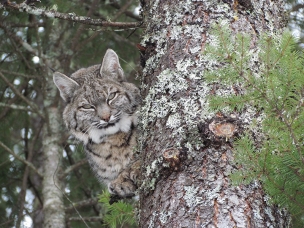
The Squamish-Lillooet Regional District is prime habitat for bobcats. The bobcat (Lynx rufus) is typically an elusive forest dweller that prefers to avoid interactions with humans. They are territorial and solitary creatures that prey on a wide range of animals i.e. rodents, rabbits, fish, small or young ungulates, livestock and pets. Despite being elusive animals, they are highly adaptable and will often have a territory that borders on the urban domain. Do not let bobcats find food, water or shelter on your property.
Follow these steps to prevent attracting bobcats:
AT HOME
- Do not attract or feed wildlife. Raccoons, mice and rabbits are natural prey and may attract bobcats.
- Do not leave pet food outside as this can attract wildlife.
- Ensure birdseed is not attracting wildlife.
- Ensure garbage is locked to prevent attracting rodents, skunks or raccoons.
- Roaming pets are easy prey: bring pets in at night. If they must stay outside at night, ensure they are in a kennel with a secure roof.
- Secure all livestock pens and coops within a well maintained electric fence.
- Cut back brush to reduce cover for bobcats to rest and to increase sight lines for better visibility.
- Install motion sensor lights
ON THE TRAILS
- Be alert and aware at all times.
- Avoid surprise encounters by making noise -- i.e. use your voice
- Keep dogs leashed. It is an offence under the BC Wildlife Act to allow your dog to pursue/chase wildlife.
- Look for signs of fresh bobcat activity -- i.e. claw marks on trees or logs, scat or paw prints.
- Riding or running quickly and quietly puts you at risk for surprise encounters. Slow down going around blind corners and make noise.
- Carry bear spray and know how to use it.
Always report wildlife sightings or injured wildlife and/or encounters to the BC Conservation Officer Service 24-hotline at 1-877-952-7277 (RAPP) or online at www.rapp.bc.ca

(Sources: Distict of Squamish)

